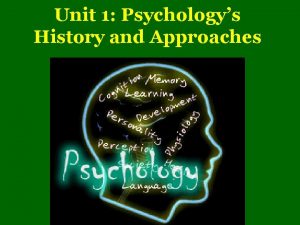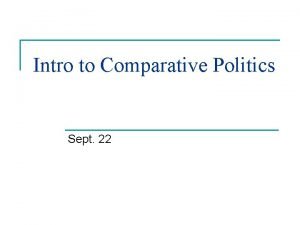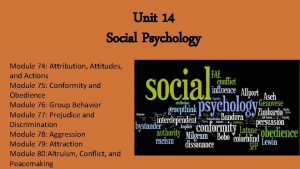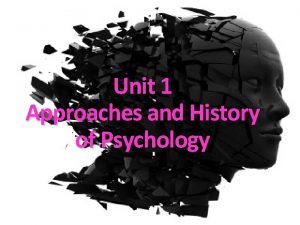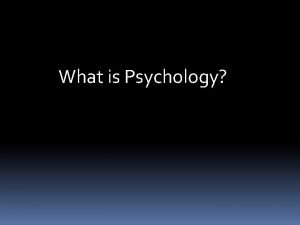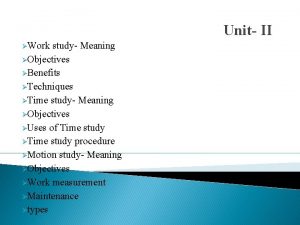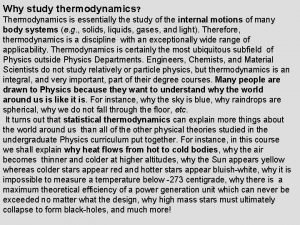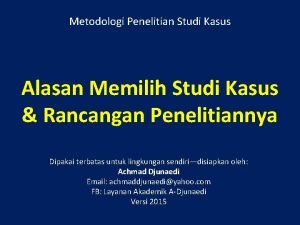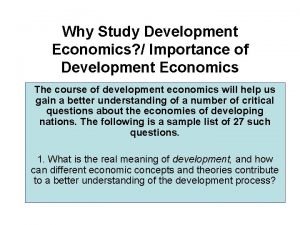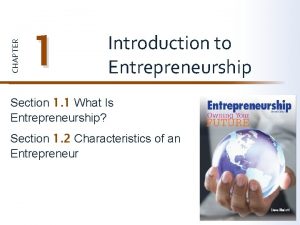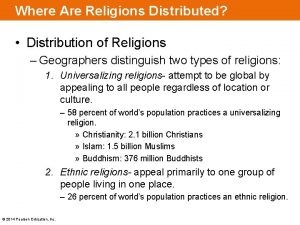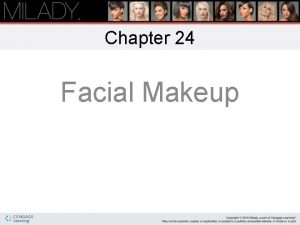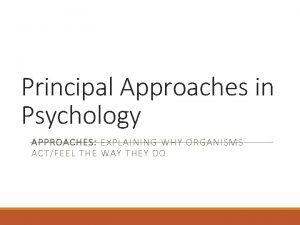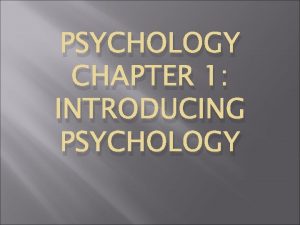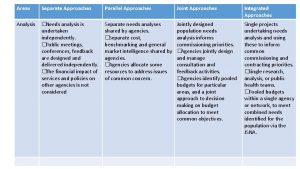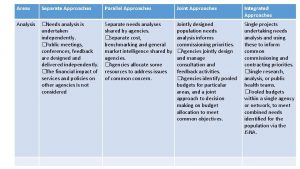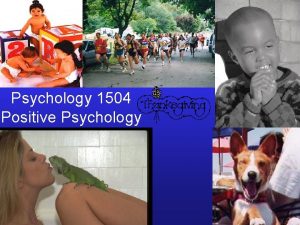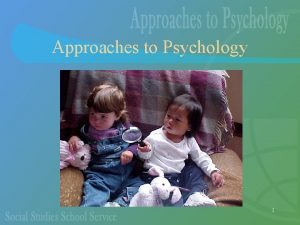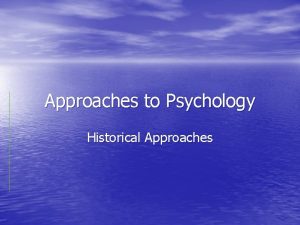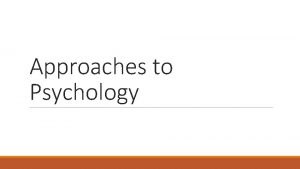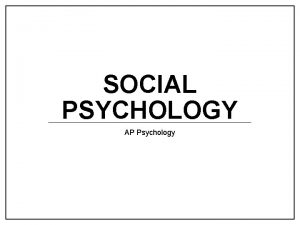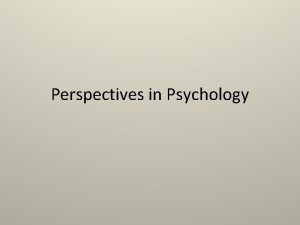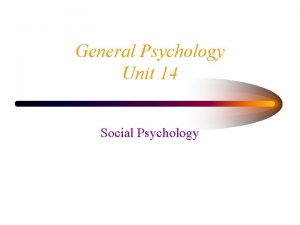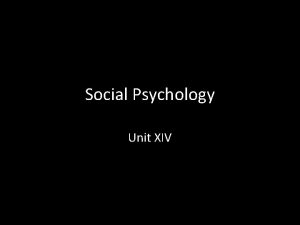Unit 1 Approaches to Psychology Why Study Psychology









































- Slides: 41

Unit 1: Approaches to Psychology Why Study Psychology?

Overview of Psychology • Psychology is the scientific study of behavior and mental processes. - This process can involve both animal and human behaviors. - When applied to humans, psychology covers everything that people think, feel, and do.

• Psychologists agree that the study of behavior must be systematic. (It is a step by step procedure) - They use systematic methods such as asking and answering questions in order to better understand why people think, act, and feel the way they do. This process reduces the chances of coming to false conclusions. - Many other approaches are needed to understand the full complexity of human behavior.

Ø When scientists study humans or animals they have several goals that they want to meet. • They want to be able to… 1. Describe 2. Explain 3. Predict 4. Influence Behavior

Description • The first goal is to describe or gather information about the behavior being studied and to present what is known.

Explanation • A Psychologists job is not to state the facts, but to seek to explain why people (or animals) behave as they do. • Psychologists propose these explanations as hypotheses (An educated guess about some phenomenon. )

• As research studies designed to test each hypothesis are completed, more complex explanations called theories are constructed. • A theory is usually a complex explanation based on findings from a large number of experimental studies. (A set of assumptions used to explain a phenomenon and offered for scientific study. )

Prediction • As a result of gathering information, psychologists can predict what organisms will do and in the case of humans, what they will think or feel in various situations. • Also, by studying descriptive and theoretical accounts of past behaviors, psychologists can predict future behaviors.

Influence • Finally, some psychologists seek to influence behavior in helpful ways. • These psychologists are conducting studies with a long-term goal of finding more about human behavior. This type of research is known as basic science. (Pursuit of knowledge about natural phenomena for its own sake. )

• Other psychologists are more interested in discovering ways to use what we already know about people to benefit others. They view psychology as an applied science and are using psychological principles to solve more immediate problems. (Using scientific findings to accomplish practical goals. )

An Example… • A psychologist who is studying rapid eye movement in sleep research is doing basic research/science. If they discover that one individual has a sleep disturbance, they will try to explain the situation, but they may not try to correct it… That is the job for applied scientists.

The Scientific Basis of Psychology • To ensure that data is collected accurately, psychologists depend on the scientific method. (General approach for gathering information and answering questions so that errors and biases are minimized) • Data is obtained from methods such as experiments, surveys, and case studies.

Question Hypothesis Experiment Additional Hypotheses Results Reject and revise Hypothesis Conclusions Theory Other psychologists react and test their theories

• Psychologists reach their conclusions by identifying a specific problem or question, formulating a hypothesis, collecting data through observation and experimentation, and analyzing data. • Although psychologists use the scientific method to support theories, many questions about behavior remain unanswered. • New theories and revised theories are constantly generating new questions and psychological studies.

History of Psychology

Introduction… • In the fifth and sixth centuries B. C. , the Greeks began to study human behavior and decided that people’s lives were dominated not so much by the gods as by their own minds. - These early philosophers attempted to interpret the world they observed around them in terms of human perceptions.

• Although the Greek philosophers did not rely on the systematic study, they did set the stage for the development of the sciences through the use of observation. • As the field of psychology evolved, various schools of thought arose to complete and offer new approaches to the science of behavior.

Early Schools of Thought • Structuralism - In 1879 in Leipzig, Germany, Wilhelm Wundt started his laboratory of Psychology. - Wundt is generally acknowledged as establishing modern psychology as a separate, formal field of study. hy lo i h P p o s Bio lo gy

- Wundt was trained in the science of how the body works, but his real interest was the human mind. - Wundt was a structuralist, which means he was interested in the basic elements of human experience. He developed a method of self-observation called introspection. (A method were participants report their thoughts and feelings. )

• Functionalism - William James (1842 -1910) focused on the functions or purposes of the conscious mind and the goals or functions or purposes of behavior. *Function of the mind, not structure* - Functionalists study how mental processes help animals and people adapt to their environment. (SURVIVAL!!!!)

• Other early forms of Psychology includes… Inheritable Traits, which tries to understand how heredity influences behavior and Gestalt psychology, which describes how feelings have a direct connection to experiences.

Contemporary Approaches • Many ideas taken from the historical approaches to psychology are reflected in contemporary approaches. The most important approaches to the study of psychology today are… - Psychoanalytic - Behavioral - Humanistic - Cognitive - Biological

Psychoanalytic Psychology - While most psychologists were interested in understanding the conscious mind, Sigmund Freud (1856 -1939) was more interested in the unconscious mind. - Freud used a technique known as free association where a patient said everything that came to mind (no matter how absurd) without trying to produce logical statement.

- Freud used the psychoanalyst tactic, where he merely sat and listened and then interpreted the associations. (Unconscious motivations influence our behavior. )

Behavioral Psychology - Russian physiologist Ivan Pavlov (1849 -1936) charted a new course for psychological investigation. - Psychologists who stressed investigating observable behavior became know as behaviorists. (Analyzes how organisms learn or modify their behavior based on their response to events in the environment. )

Humanistic Psychology - Humanistic psychology developed as a reaction to behaviorists. - In the 1960 s, humanists described human nature as evolving and self-directed. (Belief that each person has freedom in directing his or her future and achieving personal growth. )

- Humans are not controlled by events in the environment or by unconscious forces. Individual and self-directed choices influence our behavior.

Cognitive Psychology - Cognitivists focus on how we process, store, and use information and how this information influences our thinking, language, problem solving, creativity, and behavior. - They believe that behavior is more than a simple response to a stimulus; it is influenced by a variety of mental processes.

Biological Psychology - This viewpoint emphasizes the impact of biology on our behavior. - Psychobiologists study how the brain, the nervous system, and hormones and genetics influence our behavior. (This can also include physical and chemical changes within the body. ) - Recently, psychobiologists have discovered a link between chemicals in the brain and human behavior.

What Is A Psychologist?

Physiological vs. Cognitive • When psychologists first look at an individual within a situation, they look at two points of interest… The observable behavior and the unobservable questions that are developed.

1. First, the physiological needs are determined, which are the normal characteristics of an organism’s health or normal functions. - The psychologist determines whether these physiological needs are being met or what needs are being ignored. (Hunger, Sleep, etc. )

2. The psychologists’ next step would be to determine the cognitive reasons why an individual behaves the way they do. - A person’s cognitive behavior is their private, unobservable mental reasons for doing the things they do. - It is the psychologist job to discover the motivation for the behavior.

What Is A Psychologist? • Psychologists are people who have been trained to observe, analyze, evaluate, and treat behavior. (Studies the mind and behavior of humans/animals) - They usually have a doctorate degree in psychology, which they can use in a variety of fields.

• As the field of psychology expanded, it divided into a number of subfields… - Clinical psychologists – Help people deal with their personal problems. (They diagnose and treat people with emotional disturbances) - Counseling psychologists – Usually works in schools or industrial firms, advising people with the problems of everyday life.

• A psychologist is not a psychiatrist. - Psychiatry is part of the medical branch. A psychiatrist goes to medical school and learns to treat people with mental, emotional, and/or disturbed behaviors. (They can prescribe medication)

Types of Psychologists • Developmental psychologists – Study physical, emotional, cognitive, and social changes that occur throughout life, especially as an individual matures. • Educational psychologists – Deal with topics related to teaching children and young adults, such as intelligence, memory, problem solving, and motivation. (Helping students learn)

• Community psychologist – Helps design, run, or evaluate a mental health clinic. • Industrial/organizational psychologist – Studies and develops methods to boost production, improve working conditions, place applicants in jobs for which they are best suited, train people, and reduce accidents. (Improving the work place)

• Experimental psychologists – Perform research to understand how humans/animals operate physically and psychologically. - They study sensations, perceptions, learning motivations, and emotion in carefully controlled laboratory conditions. - Experimental psychologists supply information and research used in psychology.

• Other Types of Psychologists… - Environmental psychologists – Works in business settings to study the effects of the environment on people. - Psychobiologists – Study the effect of drugs or try to explain behavior in terms of biological factors.

- Forensic psychologists – Works in legal, court, and correctional systems. - Health psychologists – Study interaction between physical and psychological health factors.
 Hey hey bye bye
Hey hey bye bye The 7 approaches to psychology
The 7 approaches to psychology What is managerial approach to public administration
What is managerial approach to public administration Approaches to the study of comparative politics
Approaches to the study of comparative politics Linguistics is descriptive not prescriptive
Linguistics is descriptive not prescriptive Dont ask
Dont ask Module 74 ap psychology
Module 74 ap psychology The pearl chapter 3 vocabulary
The pearl chapter 3 vocabulary How did wilhelm wundt break down consciousness
How did wilhelm wundt break down consciousness Seven approaches to psychology
Seven approaches to psychology Structuralism vs functionalism
Structuralism vs functionalism Ap psychology module 2 review
Ap psychology module 2 review Graphic organizer activity 1 approaches to psychology
Graphic organizer activity 1 approaches to psychology Carl rogers humanistic approach
Carl rogers humanistic approach Psychology perspectives
Psychology perspectives Unit 10, unit 10 review tests, unit 10 general test
Unit 10, unit 10 review tests, unit 10 general test Case series
Case series Retrospective cohort study
Retrospective cohort study Critical examination in method study
Critical examination in method study Study less study smart
Study less study smart Study to study
Study to study Objective of work study
Objective of work study Distinguish between time study and motion study
Distinguish between time study and motion study Pressure is state function or path function
Pressure is state function or path function Why study financial markets
Why study financial markets What is biotechnology
What is biotechnology Why choose case study research design
Why choose case study research design Why study development economics
Why study development economics Why study earth science
Why study earth science What are study skills and why are they important
What are study skills and why are they important What is syntax
What is syntax What are study skills and why are they important
What are study skills and why are they important Why study entrepreneurship
Why study entrepreneurship Why do we need to study the nature and aims of business
Why do we need to study the nature and aims of business Language
Language 3 major branches of christianity
3 major branches of christianity Paragraph on beauty
Paragraph on beauty Why study entomology
Why study entomology 420 production
420 production Milady face shapes
Milady face shapes Chapter 15 scalp care, shampooing, and conditioning
Chapter 15 scalp care, shampooing, and conditioning Why study money
Why study money

